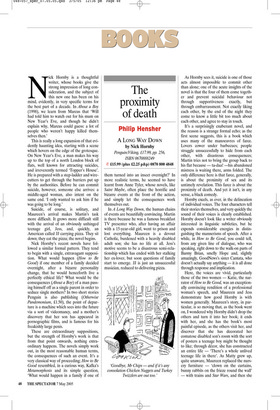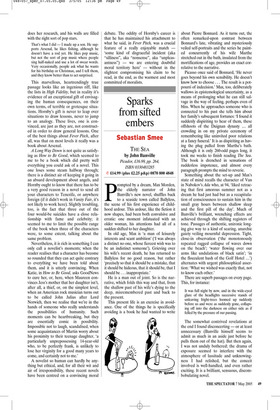The proximity of death
Philip Hensher
A LONG WAY DOWN by Nick Hornby Penguin/Viking, £17.99, pp. 256, ISBN 0670888249 ✆ £15.99 (plus £2.25 p&p) 0870 800 4848 Nick Hornby is a thoughtful writer, whose books give the strong impression of long consideration, and the subject of this new one has been on his mind, evidently, in very specific terms for the best part of a decade. In About a Boy (1998), we learn from Marcus that ‘Will had told him to watch out for his mum on New Year’s Eve, and though he didn’t explain why, Marcus could guess: a lot of people who weren’t happy killed themselves then.’ This is really a long expansion of that evidently haunting idea, starting with a scene which hovers on the edge of the grotesque. On New Year’s Eve, a man makes his way up to the top of a north London block of flats, well known for attracting suicides, and irreverently termed ‘Topper’s House’. He is prepared with a step-ladder and wirecutters to get through the barriers put up by the authorities. Before he can commit suicide, however, someone else arrives: a middle-aged woman, also intent on the same end. ‘I only wanted to ask him if he was going to be long.’ Suicide, of course, is solitary, and Maureen’s arrival makes Martin’s task more difficult. It grows more difficult still with the arrival of an obviously unhinged teenage girl, Jess, and, quickly, an American called JJ carrying pizza. They sit down; they eat the pizza; the novel begins.
Nick Hornby’s recent novels have followed a similar formal pattern. They tend to begin with a single, extravagant supposition. What would happen (How to Be Good) if one member of a family decided overnight, after a bizarre personality change, that he would henceforth live a perfectly ethical life? What would be the consequences (About a Boy) of a man passing himself off as a single parent in order to seduce single mothers? In two short stories Penguin is also publishing (Otherwise Pandemonium, £1.50), the point of departure is a machine which sees into the future via a sort of videomancy, and a mother’s discovery that her son has appeared in pornographic films, and is famous for his freakishly large penis.
These are extraordinary suppositions, but the strength of Hornby’s work is that from that point onwards, nothing extraordinary happens. The novels simply work out, in the most reasonable human terms, the consequences of such an event. It’s a very classical way of proceeding; How to Be Good resembled, in a curious way, Kafka’s Metamorphosis and its simple question, ‘What would happen in a family if one of them turned into an insect overnight?’ In more realistic terms, he seemed to have learnt from Anne Tyler, whose novels, like Saint Maybe, often place the horrific and bizarre events at the front of the action, and simply let the consequences work themselves out.
In A Long Way Down, the human chains of events are beautifully convincing. Martin is there because he was a famous breakfast TV presenter who, after having an affair with a 15-year-old girl, went to prison and lost everything. Maureen is a devout Catholic, burdened with a heavily disabled adult son; she has no life at all. Jess’s motive seems to be a disastrous semi-relationship which has ended with her stalking her ex-lover, but soon questions of family start to emerge. JJ is just an unsuccessful musician, reduced to delivering pizza. As Hornby sees it, suicide is one of those acts almost impossible to commit other than alone; one of the acute insights of the novel is that the four of them come together and prevent suicidal behaviour not through supportiveness exactly, but through embarrassment. Not exactly liking each other, by the end of the night they come to know a little bit too much about each other, and agree to stay in touch.
It’s a surprisingly exuberant novel, and the reason is a strange formal echo; as the first scene suggests, this is a book which uses many of the manoeuvres of farce. Lovers cower under barbecues; people struggle unsuccessfully to hide from each other, with disastrous consequences; Martin tries not to bring the group back to his flat because — ta-daa! —his abandoned mistress is waiting there, arms folded. The only difference here is that farce, generally, is about the proximity of sex and its untimely revelation. This farce is about the proximity of death. And yet it isn’t, in any sense, a black comedy.
Hornby excels, as ever, in the delineation of individual voices. The four characters tell their stories themselves, and very quickly the sound of their voices is clearly established. Hornby doesn’t look like a writer obviously interested in linguistic subtleties, but he expends considerable energies in distinguishing the mannerisms of speech. After a while, in How to Be Good, you could tell, from any given line of dialogue, who was speaking, right down to the walk-on parts of Barmy Brian, smelly Hope and, slightly amazingly, GoodNews’s sister Cantata, who doesn’t actually say anything — it is all done through response and implication.
Here, the voices are vivid, particularly those of the two women — Katie, the narrator of How to Be Good, was an exceptionally convincing rendition of a professional woman’s speech, and Maureen and Jess demonstrate how good Hornby is with women generally. Maureen’s story, in particular, is so moving that, as the book went on, I wondered why Hornby didn’t drop the others and turn it into her book; it ends with her, and she has the book’s most painful episode, as the others visit her, and discover that she has decorated her comatose disabled son’s room with the sort of posters a teenage boy might be thought to like; through décor, she has constructed an entire life — ‘There’s a whole unlived teenage life in there’. As Matty grew up, quite unaware, Maureen replaced the nursery furniture — ‘clown on the curtains, bunny rabbits on the frieze round the wall’ — with trains and Star Wars, and then she does her research, and his walls are filled with the right sort of pop stars.
That’s what I did — I made up a son. He supports Arsenal, he likes fishing, although he doesn’t have a rod yet. He likes pop music, but not the sort of pop music where people sing half-naked and use a lot of swear words. Very occasionally, people ask what he wants for his birthday or Christmas, and I tell them, and they know better than to act surprised.
This marvellous, heartrendingly true passage looks like an ingenious riff, like the lists in High Fidelity, but in reality it’s evidence of an exceptional gift of envisaging the human consequences, on their own terms, of terrible or grotesque situations. Hornby’s gift is never to leap over situations to draw lessons, never to jump to an analogy. These lives, one is convinced, are just as they are, not constructed in order to draw general lessons. One of the best things about Fever Pitch, after all, was that on most levels it really was a book about Arsenal.
A Long Way Down is not quite as satisfying as How to Be Good, which seemed to me to be a book which did pretty well everything you could ask of a novel. This one loses some steam halfway through; there is a distinct air of keeping it going in an absurd development about angels, and Hornby ought to know that there has to be a very good reason in a novel to send all your characters to Tenerife, or anywhere foreign (if it didn’t work in Vanity Fair, it’s not likely to work here). Slightly troubling, too, is the fact that three out of the four would-be suicides have a close relationship with fame and celebrity; it seemed to me to limit the possible range of the book when three of the characters were, to some extent, talking about the same problem.
Nevertheless, it is rich in something I can only call a novelist’s moments; when the reader realises that a character has become so rounded that they can act quite contrary to everything we have been told about them, and it is utterly convincing. When Katie, in How to Be Good, asks GoodNews to cure her, or, here, when Maureen convinces Jess’s mother that her daughter isn’t, after all, a thief, or, on the simplest level, when an American rock musician turns out to be called John Julius after Lord Norwich, then we realise that we’re in the hands of someone who really understands the possibilities of humanity. Such moments can be heartbreaking, but they are essentially comic in possibility. Impossible not to laugh, scandalised, when some acquaintances of Martin worry about his proximity to their teenage daughter, ‘a particularly unprepossessing 14-year-old who, to be perfectly frank, is unlikely to lose her virginity for a good many years to come, and certainly not to me.’ A novelist so human can hardly be anything but ethical, and, for all their wit and air of irresponsibility, these recent novels have been centred on a convincing moral debate. The oddity of Hornby’s career is that he has maintained his attachment to what he said, in Fever Pitch, was a crucial feature of a really enjoyable match — ‘some kind of disgraceful incident (aka “silliness”, aka “nonsense”, aka “unpleasantness”) — we are entering doubtful moral territory here’ — without in the slightest compromising his claim to be read, in the end, as the warmest and most committed of moralists.




























































 Previous page
Previous page